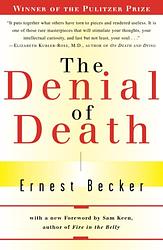The Denial of Death by Ernest Becker
"The Denial of Death" is a thought-provoking examination of the influence of death on human behavior and society. The author argues that the fear of death is a primary motivator in human life, influencing our actions, beliefs, and relationships. He explores how culture and religion are often mechanisms to deny and transcend the reality of death, offering symbolic immortality through beliefs in the afterlife or in the enduring impact of one's life work. The book also delves into the psychological impact of this denial and the concept of the "heroic individual" who seeks to leave a lasting legacy.
The 9352nd greatest book of all time
- Published
- 1973
- Nationality
- American
- Type
- Nonfiction
- Pages
- 336
- Words
- Unknown
- Original Language
- English
If you're interested in seeing the ranking details on this book go here
This book is on the following lists:
- Pulitzer Prize for Non-Fiction (Pulitzer Prize)

